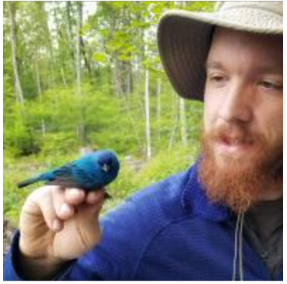 Mike Thompson, B.S.
Mike Thompson, B.S.
UNH Wildlife and Conservation Biology alum.
My path has been long and winding. I grew up in southern NH and have always been interested in the outdoors and science, but I was not always a good student. In high school, I always had a very hard time completing assignments, doing my homework, and focusing (which I recently found out is most likely due to undiagnosed ADHD), and I graduated high school with a 1.8 GPA.
With no money to attend a college at the time, I bumped around trying my hand at being an EMT, then attempted nursing school, both of which I dropped out of. Throughout high school and afterwards, I was passionate about rock climbing so when my local gym needed some help I jumped at the opportunity and started working there.
I worked at the climbing gym for 7 years. As a licensed rock-climbing guide, I ran the youth programs and helped manage two locations. During that time, I became more and more interested in the outdoors, specifically birds. This passion progressed to the point where if I wasn’t climbing, I was looking through a pair of binoculars. I stopped spending my money on climbing trips and started spending my money and time on birding trips in search of the birds I hadn’t seen before. This passion led me to NH Audubon where I volunteered for several different field technician positions including bird and dragonfly surveys.
My skills as a rock climber came in handy when I was asked to help band peregrine falcons which nest on the sides of cliffs. While the Audubon biologist wasn’t very comfortable 200ft in the air, I could easily set up and bring both of us down to the nest to band the chicks. Near the end of my time at the climbing gym, I got married. I knew I didn’t want to work there forever so I decided to return to school.
Knowing myself a little better at that point, I decided against jumping right into a four-year program and instead opted to go to community college. I went to NHTI in Concord, NH, and earned an Associate Degree in Environmental Science. While there, I learned two important things that would shape the rest of my career. First, I knew I didn’t want to stay in environmental science. The concepts were too big. Much of the science dealt with abiotic factors rather than the biotic relationships that I really loved thinking about. Second, I learned that I truly love research. Based on the self-directed experiments I conducted while at NHTI, and my work at Audubon, I knew my next step needed to involve research. From NHTI, I transferred to UNH where I completed a degree in Wildlife and Conservation Biology and graduated with a 3.87 GPA (a far cry from my 1.8 high school GPA!).
At UNH, I did undergraduate research on shrubland birds through both my Honors Thesis and a Summer Undergraduate Research Fellowship (SURF). Both projects put me in contact with incredible faculty and enabled me to build relationships that would help me later on. After graduation I took a temporary job as an easement monitor before applying for my current position as a research scientist here at UNH.
My path has been what I call unconventional, but it has taught me a lot along the way. First, a straight-line path from high school to college to grad school is not for everyone – I was 25 when I started my college coursework (NHTI) and 29 when I finished my bachelor’s degree (UNH). Second, everyone’s path will involve certain skills that are transferable to any profession. Things like being punctual, reliable, and positive (esp. a positive attitude despite harsh field conditions) have gotten me very far in my career.
The most important thing I learned about undergrad is to be more than a name on a roster. Get to know your professors. Show up early to class and talk about something interesting you read or your weekend plans to go birding or hiking. Stay after class and ask thoughtful questions. Go to office hours. This moves you from a name on a piece of paper to a person who really cares about what they are doing and in turn you will be remembered. People will think of you when positions come up, or when it’s time to ask for letters of recommendation.
Finally, I would say it is hard to push through the tough parts of any job if you aren’t passionate, so follow what gets you excited whether that is working with a particular species, doing outreach, or helping shape policies. Look for that passion and focus on it.